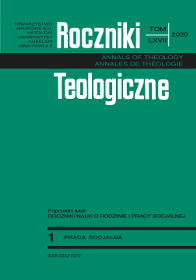Radzenie sobie w sytuacjach trudnych a preferencje wartości osób bezrobotnych z problemem uzależnienia
Developing Different Situations and the Preferences of the Values of Unemployed People with the Problem of Addiction
Author(s): Janusz KirenkoSubject(s): Social Sciences, Sociology, Substance abuse and addiction
Published by: Towarzystwo Naukowe KUL & Katolicki Uniwersytet Lubelski Jana Pawła II
Keywords: unemployment; coping with difficult situations; values; addiction to alcohol; nicotine and the Internet
Summary/Abstract: 244 people were examined, including 173 unemployed and 71 professionally active people. The unemployed group consisted of 53 women (35.3%) and 120 men (64.7%), while in the working group there were 24 women (33.8%) and 47 men (66.2%). Most of the unemployed surveyed, 154 (89.0%), did not have the right to benefit, the remaining 19 people (11.0%) had the right to various forms of support. The age of the unemployed ranged from 21 to 63 years, with an average of 36.8 years, while those employed, from 20 to 54 years, with an average of 32.7 years. Both in the one and in the second group prevailed people with secondary education, including post-secondary or post-secondary education as well as basic vocational education over people with higher and primary education. Among the unemployed, 58 people were addicted to alcohol, 54 people from nicotine and 61 people from the Internet. The research material was collected using the diagnostic survey method, which included the following research tools: COPE Questionnaire (C.S. Carver, M.F. Scheier, J.K. Weintraub), the Valuation Questionnaire (PVQ-R2 – S. Schwartz), the “Alcohol Attitude Investigation Survey,” Nicotine Fagerström Questionnaire of Tolerance, Questionnaire on Internet Use Problems (PUI – K. Young) and questionnaire. A specific structure of compounds of selected variables was obtained: explained coping in difficult situations, explaining the preferences of values and the intermediary type of addiction. Those that have a strong support in empiricism have been emphasized. The applied multiple regression enabled the adoption of relatively precise characteristics of the compounds obtained claiming the status of autonomous conclusions.
Journal: Roczniki Teologiczne
- Issue Year: 67/2020
- Issue No: 1
- Page Range: 87-109
- Page Count: 23
- Language: Polish

